Log10 (x) can be written as log10 (e) *loge (x) loga (b) = loga (e) * loge (b) so y = log10 (e) * loge (x) dy/dx = log10 (e) d (loge (x))/dx, since log10 (e) is a constantThe formula for logrithmic function is given as d/dx (log x)=1/x If x is any function of x then, above formula becomes as, d/dx (log f (x))=1/f (x) ×d/dx (f (x)) So as per above formula the answer for ur question is, d/dx (log 4x)=(1/4x) × d/dAnswer to Find first and second derivative of the following y=log_{10}(x) By signing up, you'll get thousands of stepbystep solutions to your

Find Second Order Derivative Of Log Logx Youtube
What is the derivative of log x
What is the derivative of log x-This is also one of the main reasons of the importance of the constant e Ex 57, 4 Find the second order derivatives of the function log𝑥 Let y = log𝑥 Differentiating 𝑤𝑟𝑡𝑥 𝑑𝑦/𝑑𝑥 = (𝑑(log𝑥))/𝑑𝑥 𝑑𝑦/𝑑𝑥 = 1/𝑥 Again Differentiating 𝑤𝑟𝑡𝑥 𝑑/𝑑𝑥




Y Log 10 X Differentiate The Function Youtube
Derivative of Log X A function defined by y = log a x, x > 0, where x = a y, a > 0, a ≠ 1 is called the logarithm of x to the base a The common logarithmic function is written as y = log 10 x We shall prove the formula for the derivative of the natural logarithm function using definition or the first principle methodSolve your math problems using our free math solver with stepbystep solutions Our math solver supports basic math, prealgebra, algebra, trigonometry, calculus and moreCalculus Find the Derivative d/dx y = log base 5 of x y = log5 (x) y = log 5 ( x) The derivative of log5(x) log 5 ( x) with respect to x x is 1 xln(5) 1 x ln ( 5) 1 xln(5) 1 x ln ( 5)
If y = log x/x, show that d2y/dx2 = 2log x 3/x3 Welcome to Sarthaks eConnect A unique platform where students can interact with teachers/experts/students to getCalculus Find the Derivative d/dx y = log base 2 of x y = log2 (x) y = log 2 ( x) The derivative of log2(x) log 2 ( x) with respect to x x is 1 xln(2) 1 x ln ( 2)Derivative Of Log Y Mathematics Stack Exchange For more information and source, see on this link https//mathstackexchangecom/questions//derivativeoflogy
Derivative of y = ln u (where u is a function of x) Unfortunately, we can only use the logarithm laws to help us in a limited number of logarithm differentiation question types Most often, we need to find the derivative of a logarithm of some function of xFor example, we may need to find the derivative of y = 2 ln (3x 2 − 1) We need the following formula to solve such problemsY = log7 logx y = loge 7loge logx dxdy = loge 71 (logx 1 ) dxd logxdxdy = loge 71 logx1 x1 dxdy = loge 7xlogx1 ∴ dxdy = loge 7xlogx1Y=log(logx) let t=logx so y=log(t) dy/dt= d/dt (log(t)) = 1/t and t= log(x) so dt/dx = d/dx (log(x)) = 1/x dy/dx= dy/dt * dt/dx dy/dx= 1/t * 1/x = 1/tx dy/dx=1/xlog(x)



Content Graphing Logarithmic Functions




Finding The Derivative Of Log X Video Lesson Transcript Study Com
Find the derivative of function {eq}y= log (2x) {/eq} Chain Rule The derivative of a function determines its rate of change with respect to an independent variable When we consider aDerivatives of Logarithmic Functions On the page Definition of the Derivative, we have found the expression for the derivative of the natural logarithm function y = lnx (lnx)′ = 1 x Now we consider the logarithmic function with arbitrary base and obtain a formula for its derivative y'=(2x)/((x^21)ln10) Use the derivative formula d/dx (log_a u)=1/(u lna) *u' to find y' Note that u=x^21, u'=2x




Ex 5 7 9 Find Second Order Derivatives Of Log Log X




Find The Derivatives W R T X X Y Log Xy
1 I would just like to check if this partial derivatives are right I am using the chain rule It's just that it still confuses me a bit, differentiating in two variables If f ( x, y) = l o g ( x / y), then δ f δ x = 1 x y ( 1 y) = y x 1 y = 1 x δ f δ y = 1 x y ( − x y 2) = y x − x y 2 = − 1 y multivariablecalculusThe derivative of y = log x where the base is a, is found by changing to base eWhat is the derivative of ?




Ex 5 7 4 Find Second Order Derivatives Of Log X Teachoo



1
Answer to Find the derivative of the following y = log_x (x 1) By signing up, you'll get thousands of stepbystep solutions to your homeworkDifferentiate the function y = log 2 ( x log 5 x ) Buy Find launch Single Variable Calculus Early Tr 8th Edition James Stewart Publisher Cengage Learning ISBN Ch 34 Find the 1000th derivative of f(x) = xex Ch 34 The displacement of a particle on a vibrating Ch 34 If the equation of motion of aWe have to find the derivative of log 10 x Solution We define log functions as the inverses of exponentials y = ln(x) ⇔ x=e y y=log 10 (x) ⇔ x=10 y Since we know how to differentiate exponentials, we can use implicit differentiation to find the derivatives of ln(x) and loga(x)
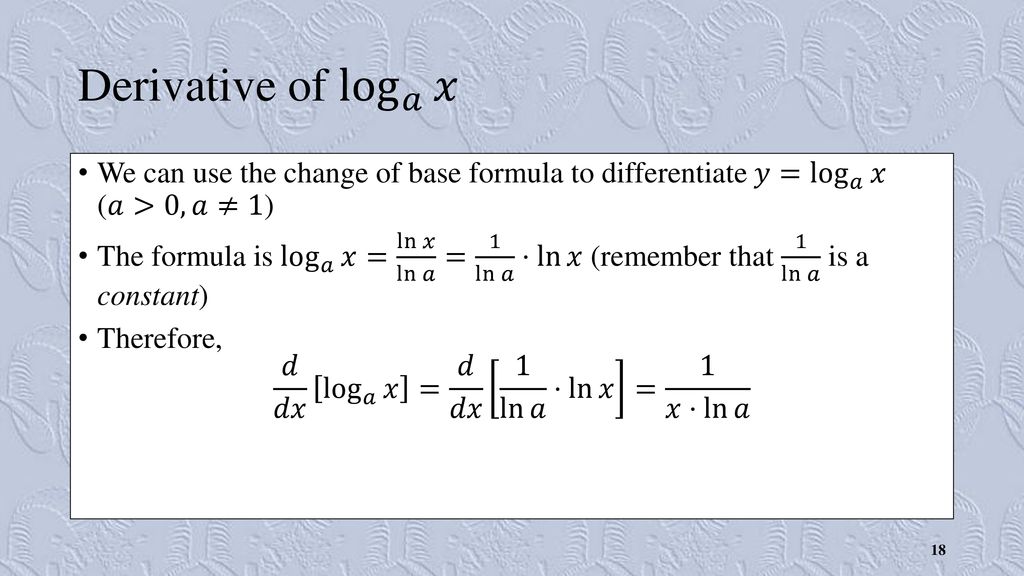



Derivatives Of Exponential Logarithmic Functions Ppt Download




Derivative Of Log Base 10 Of X Novocom Top
Solve your math problems using our free math solver with stepbystep solutions Our math solver supports basic math, prealgebra, algebra, trigonometry, calculus and moreThis implies that ln x is the unique antiderivative of 1/x that has the value 0 for x =1 It is this very simple formula that motivated to qualify as "natural" the natural logarithm;Answer to Find the derivative of the following y = log_x (sec x) By signing up, you'll get thousands of stepbystep solutions to your homework



What Is The Differentiation Of Log Base X Of A Quora




Find The Second Order Derivatives Of The Function X3 Log X Mathematics Shaalaa Com
Stack Exchange network consists of 177 Q&A communities including Stack Overflow, the largest, most trusted online community for developers to learn, share their knowledge, and build their careers Visit Stack Exchange Ex 57, 9 Find the second order derivatives of the function 〖 log〗〖 (log〖𝑥)〗 〗 Let y =〖 log〗〖 (log〖𝑥)〗 〗 DifferentiatingThe derivative of ln x is 1/x;
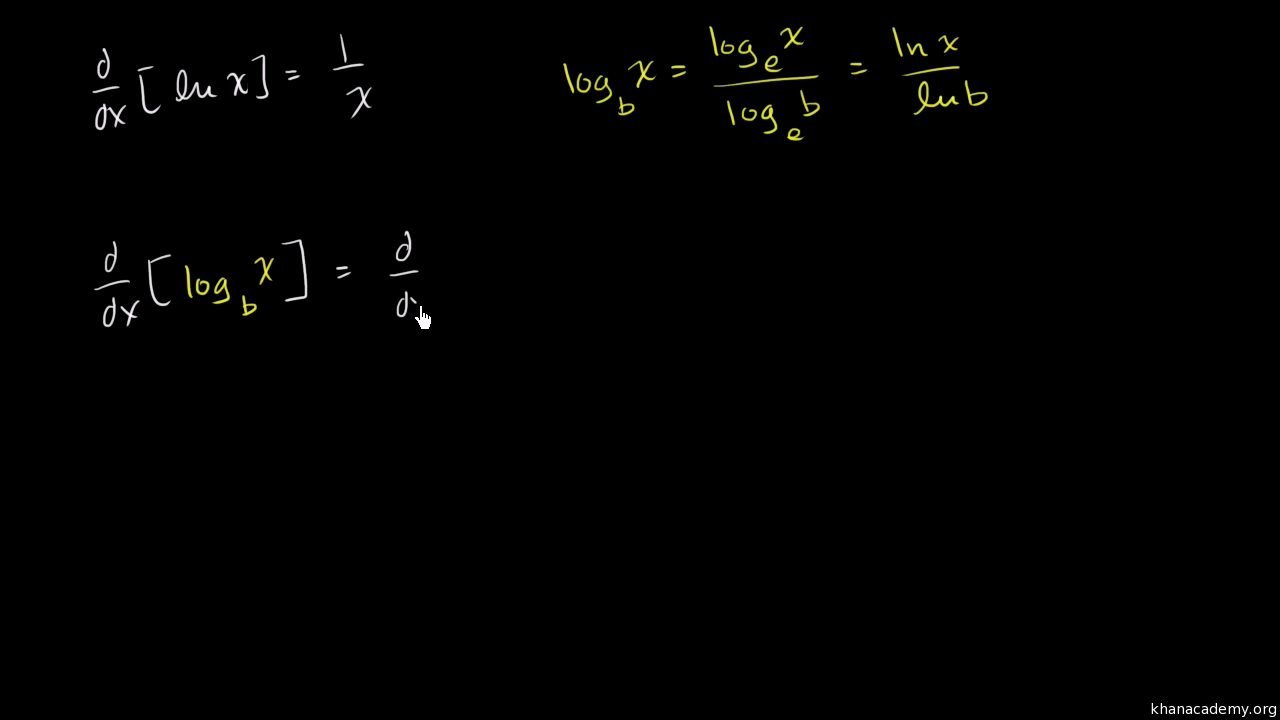



Derivative Of Logarithm For Any Base Old Video Khan Academy
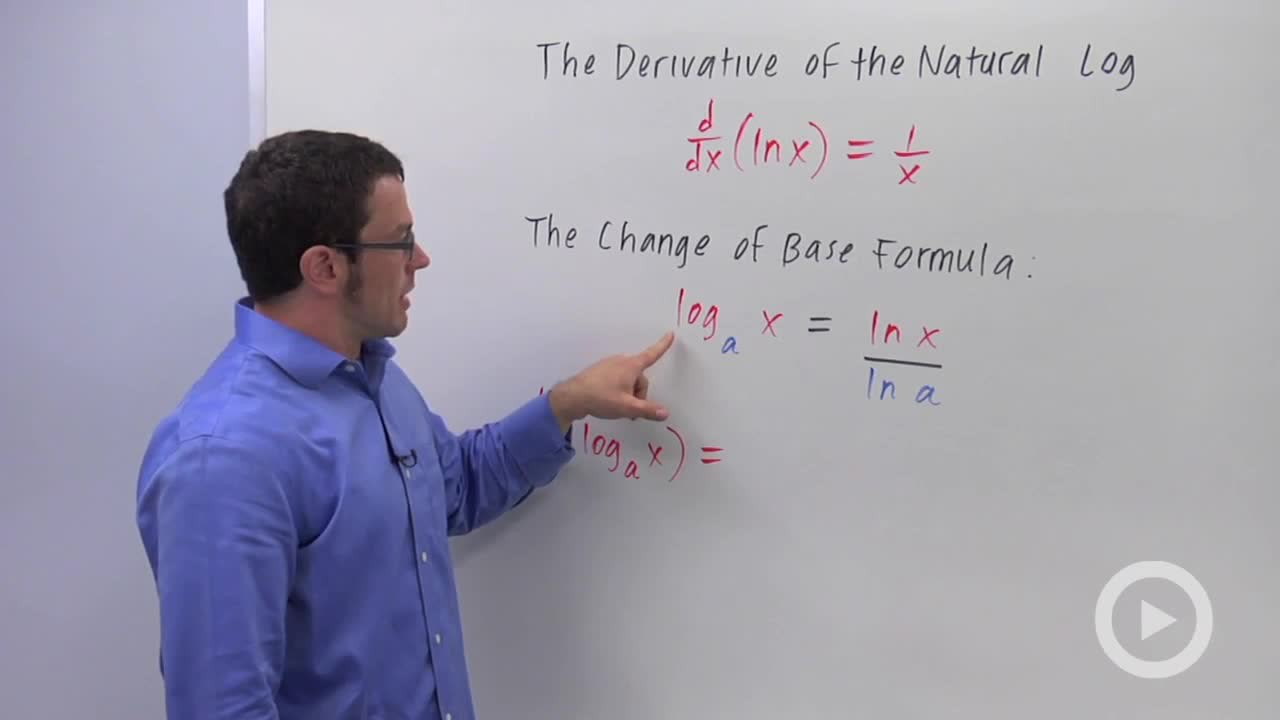



Derivatives Of Logarithmic Functions Problem 3 Calculus Video By Brightstorm
In doing this, the Derivative Calculator has to respect the order of operations A specialty in mathematical expressions is that the multiplication sign can be left out sometimes, for example we write "5x" instead of "5*x" The Derivative Calculator has to detect these cases and insert the multiplication signSolution Using the linear properties of the derivative and the chain rule, we obtain {y'\left( x \right) = {\left( {{{\log }_3}\frac{3}{x} \frac{3}{x}} \right Explanation The derivative of y = log(u) is dy dx = loge ⋅ 1 u × d dx (u), since lnx = 1 logelogx, and d(lnx) dx = 1 x Following these exact steps we get dy dx = loge ⋅ 1 x2 1 × 2x The final answer is dy dx = 2xloge x2 1 Answer link




Finding The Derivative Of Log X Video Lesson Transcript Study Com



If X Y E X Y Show That Dy Dx Logx Log Xe 2 Sarthaks Econnect Largest Online Education Community
About Press Copyright Contact us Creators Advertise Developers Terms Privacy Policy & Safety How works Test new features Press Copyright Contact us CreatorsSolve your math problems using our free math solver with stepbystep solutions Our math solver supports basic math, prealgebra, algebra, trigonometry, calculus and moreClick here 👆 to get an answer to your question ️ derivative of y=log(x^x)^x kamalsingh0003 kamalsingh0003 Math Secondary School answered Derivative of y=log(x^x)^x 2




Misc 7 Differentiate Log X Log X Chapter 5 Class 12




Find The Second Order Derivatives Of The Function Log Log X Mathematics Shaalaa Com
In this video learn how to find the derivative of a function by first principle with makes u comfortable and easier in approachi hope u will get benefited bThe logarithmic function y log b x is the inverse function of the exponential function x b y Most often we need to find the derivative of a logarithm of some function of x for example we may need to find the derivative of y 2 ln 3x 2 1 Derivative of logarithm That derivative approaches 0 that is becomes smaller F x log b xFind the Derivative d/dx y=( log of x)/(1 log of x) Differentiate using the Quotient Rule which states that is where and The derivative of with respect to is Differentiate Tap for more steps By the Sum Rule, the derivative of with respect to is



Find The Nth Derivative Of Y Log 1 X Math Homework Answers




Dyif Y Log X X Thendx
The derivative of x is 1 1 y' (x) = d/dx (log (2 x^4)/log (x)) Use the quotient rule, d/dx (u/v) = (v ( du)/ ( dx) u ( dv)/ ( dx))/v^2, where u = log (x^4 2) and v = log (x) y' (x) = (log (x) d/dx (log (2 x^4)) log (2 x^4) d/dx (log (x)))/ (log (x)^2) Using the chain rule, d/dx (log (x)) = ( dlog (u))/ ( du) ( du)/ ( dx), where u = x and d/ ( du) (log (u)) = 1/uWe have to find the derivative of log x Solution We define log functions as the inverses of exponentials y = ln(x) ⇔ x=e y y=log a (x) ⇔ x=a y Since we know how to differentiate exponentials, we can use implicit differentiation to find the derivatives of ln(x) and loga(x) d/ dx ln(x) = 1/x d/ dx log a (x)= 1/ x ln a Answer In your case $\ln y = x \log \log x$, which one can differentiate as usual $\endgroup$ – Chip Mar 2 '16 at 613 $\begingroup$ @kmitov It worked I was making a mistake in applying the chain rule in last step



How Do You Find The Derivative Of E X Log X Socratic




If Y Sin X Log X Then Dy Dx
Derivative of y = Log (x) and y = Ln (x) Watch later Share Copy link Info Shopping Tap to unmute If playback doesn't begin shortly, try restarting your device You're signed outThis calculus video explains how to find the derivative of x^x^x using a technique called logarithmic differentiation which is useful for differentiating expSolve your math problems using our free math solver with stepbystep solutions Our math solver supports basic math, prealgebra, algebra, trigonometry, calculus and more



5 Derivative Of The Logarithmic Function




What Is The Derivative Of X 2 Log X Quora
y = logbx ⇒ by = x take logs to base e lnby = lnx ⇒ ylnb = lnx now differentiate wrt x d dx (ylnb) = d dx (lnx) lnb dy dx = 1 xAnswer to Find the derivative of the function y = log(x*sqrt(x^2 7)) By signing up, you'll get thousands of stepbystep solutions to yourX) Now see if you can continue As per your comment above, if log is meant to be of a different base, say log b, the same tactic works You would have e ( log b x) instead x Take a logarithm of both sides to get log x Differentiate both sides to get y ′ y = 2 log



Differentiate Log X X2 A W R T X Studyrankersonline
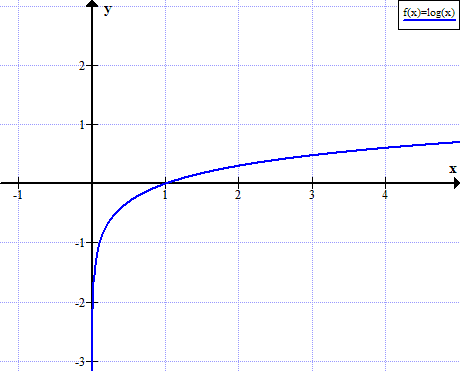



Log Rules Logarithm Rules
Ex 57, 5 Find the second order derivatives of the function 𝑥^3 log𝑥 Let y = 𝑥^3 log𝑥 Differentiating 𝑤𝑟𝑡𝑥 𝑑𝑦/𝑑𝑥 = (𝑑(𝑥^3 " " log𝑥))/𝑑𝑥 𝑑𝑦/𝑑𝑥 = 𝑑(𝑥^3 )/𝑑𝑥 log𝑥 (𝑑(log𝑥))/𝑑𝑥 𝑥^3 using product rule in 𝑥^3 𝑙𝑜𝑔𝑥Solve your math problems using our free math solver with stepbystep solutions Our math solver supports basic math, prealgebra, algebra, trigonometry, calculus and more




A Simple Proof Of The Derivative Of An Inverse Function Themathbeard
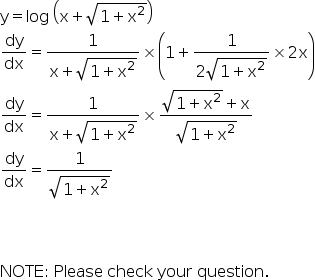



If Y Log X 1 X2 1 2 Prove That Dy Dx 1 Log X 1 X2 1 2 1 1 X2 1 2 Mathematics Topperlearning Com Qsw6n0xx




The Derivative Of Y Log X For Any Positive Base A Youtube




Differentiate Y Log 1 X 2x 2 X Please Answer This Question Maths Application Of Derivatives 1979 Meritnation Com




Derivative Of Log Y Mathematics Stack Exchange




If Y Log Log Logx 3 Then Dy Dx



5 Derivative Of The Logarithmic Function




Logarithm Wikipedia




If Y Log7 Log X Find Dydx




Content The Natural Logarithm




Mathematics Differentiation And Derivative
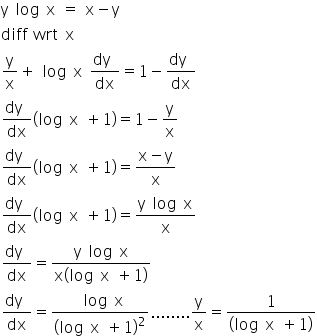



If Y Log X X Y Prove That Dy Dx Log X 1 Log X 2 Mathematics Topperlearning Com 2dolmeyy



What Is The Nth Derivative Of Logx Quora




5 Find The Derivative Of Y Log 2sin X Dx Dy Gauthmath
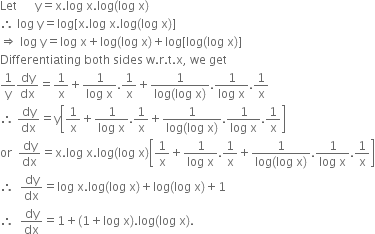



Differentiate X Logx Log Log X W R T X From Mathematics Continuity And Differentiability Class 12 Up Board




Derivative Of Log Log X 2 With Respect To X Is




Derivative Of Y Log X And Y Ln X Youtube




Content The Natural Logarithm




Why Is It That Natural Log Changes Are Percentage Changes What Is About Logs That Makes This So Cross Validated



Find The Derivative Of Log X X Xlog X Stumbling Robot



What Will Be The Derivative Of X Ylog Xy Quora



Q Tbn And9gcrcifas9tk9ynnvxnsymerpbvtqhsvwlu9sla5hips1tnshbunu Usqp Cau




Y Log 10 X Differentiate The Function Youtube
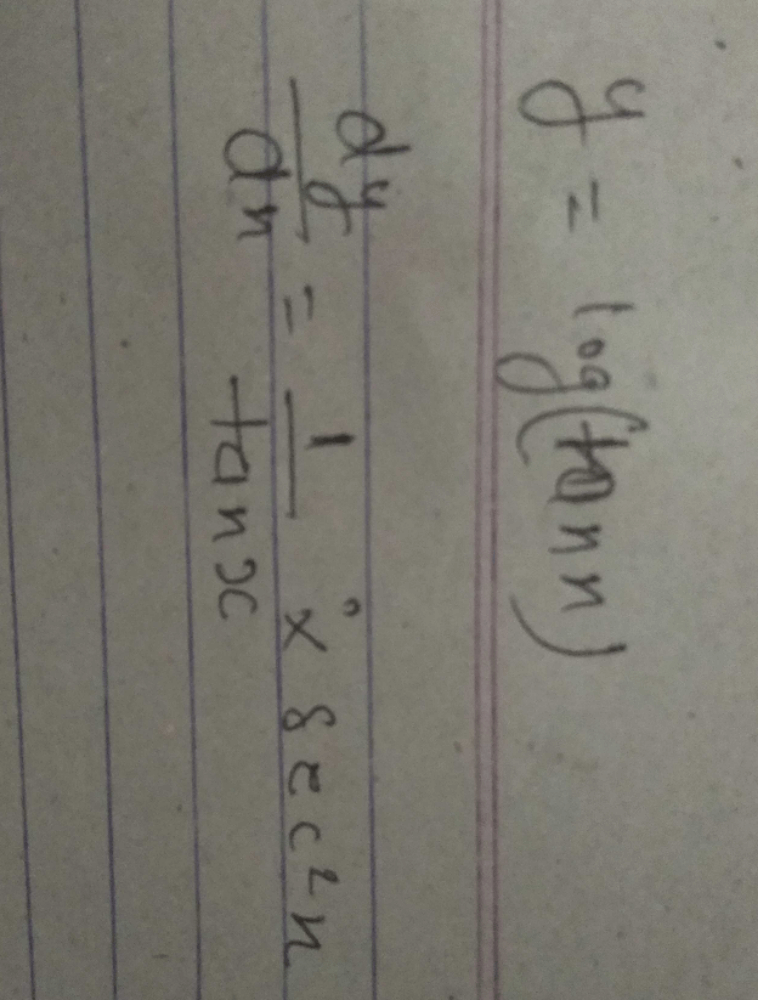



If Y Log Tan X Find Dy Dx Edurev Jee Question



How To Differentiate Log Log X Quora




Derivative Of Logarithm For Any Base Old Video Khan Academy




Differentiate The Function Y Log X 4x3 Brainly In



5 Derivative Of The Logarithmic Function
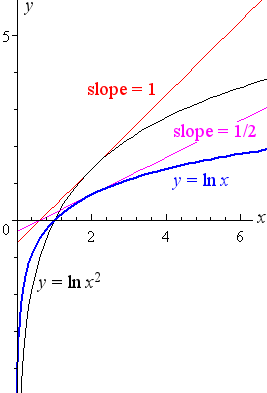



5 Derivative Of The Logarithmic Function




Find Second Order Derivative Of Log Logx Youtube




Second Derivative Of Y Log Logx Brainly In




Solving The Derivative Of Ln X Video Lesson Transcript Study Com




If Y Logx X Then Show That Second Derivative Of Dy Dx 2logx 3 X 3 Brainly In




What Is The First Derivative Of Sum Log A X B Y C Z With Respect To X Y Z Quora




Calculus Derivative Of The Natural Log Ln Video Lessons Examples Solutions



Q Tbn And9gcq69xqaiwgxy95 44f5sqsm2pnlgxvor Roue6xadfczqpkv4qx Usqp Cau



Solved Find The Derivatives 1 Y X 1 X 5 2 Y Log X 2 3 Y 5x Course Hero




Chain Rule Derivative Logarithm




If Y Log X Sin X Find Dy Dx Brainly In



If Y Sin Log X Prove That Mathematics Topperlearning Com Pka0czx




Find Second Derivative Of Log X Calculus Youtube
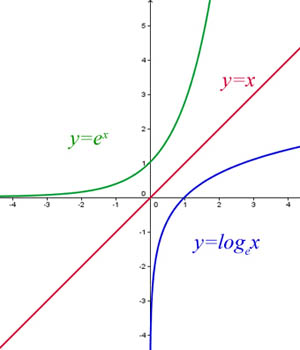



The Derivative Of Exponentials Logarithms Differential Calculus Pure Mathematics From A Level Maths Tutor
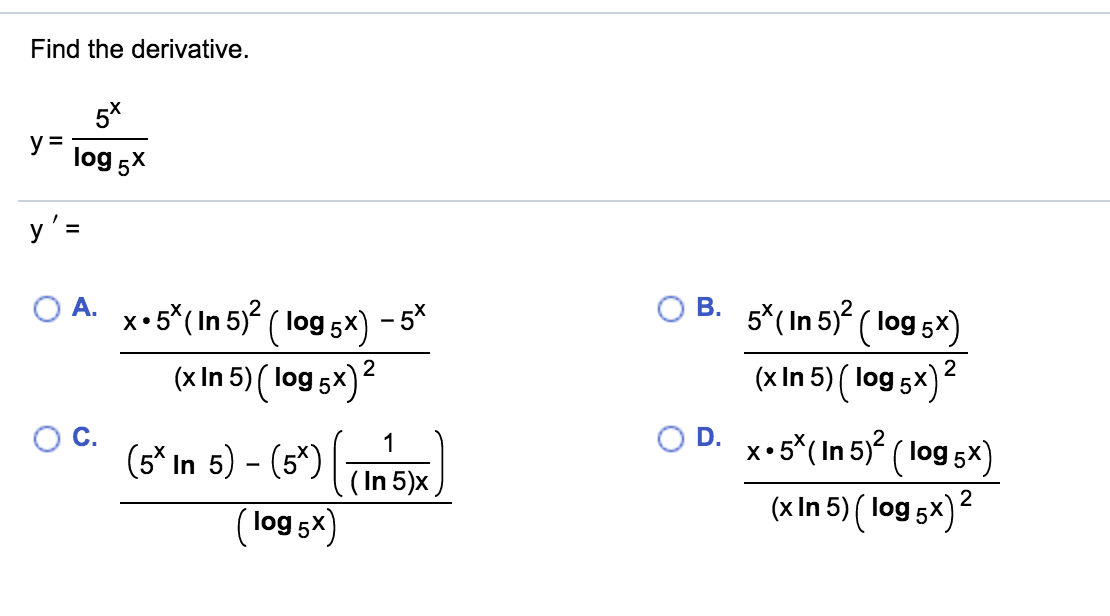



Find The Derivative 5 Y Log 3x Y O A X 54 In 5 2 Chegg Com



Logarithmic Differentiation Geeksforgeeks
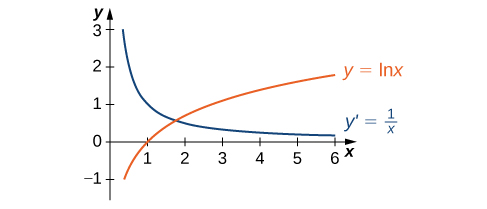



3 9 Derivatives Of Exponential And Logarithmic Functions Calculus Volume 1




If Y Logx X Then Show That Second Derivative Of Dy Dx 2logx 3 X 3 Brainly In




Misc 7 Differentiate Log X Log X Chapter 5 Class 12
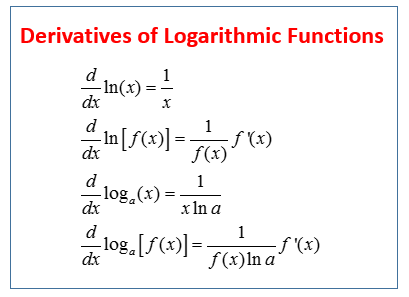



Calculus Derivative Of The Natural Log Ln Video Lessons Examples Solutions



Finding The Derivative Of Log X Video Lesson Transcript Study Com



What Is The Derivative Of X 2 Log X Quora




What Is The Derivative Of Log Y With Respect To X Mathematics Stack Exchange




Ex 5 4 8 Ex 5 4




Derivative Of X 2 Y 2 Log Xy Youtube



Logarithmic Differentiation Geeksforgeeks
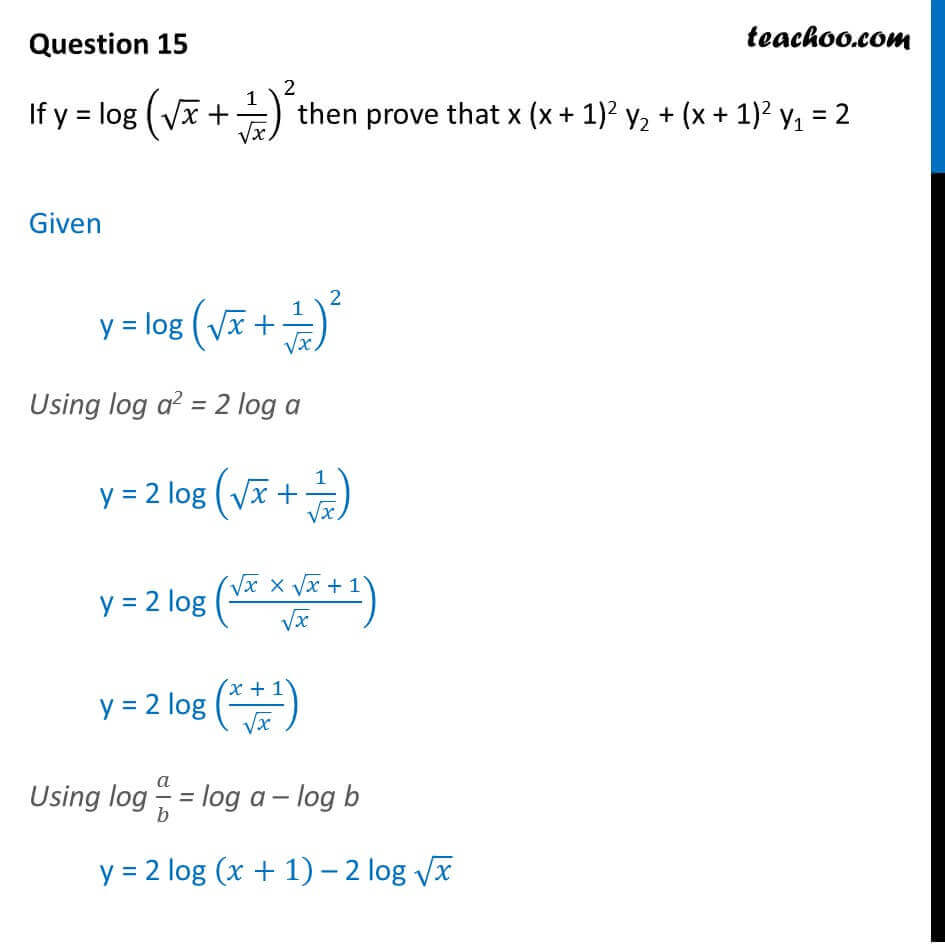



If Y Log Root X 1 Root 2 Then Prove X X 1 2 Y2 X 1 2 Y1




If Y Log X 3 Then Dy Dx




Find Nth Derivative Of Log X 2 A 2




If Y Logx X Show That D 2y Dx 2 X 1 3 Youtube



What Is The Derivation Of Log Logx Quora



1




What Is The Second Derivative Of Y Log X 2 E X Maths Continuity And Differentiability Meritnation Com




Derivative Of Log 10 X Novocom Top




Derivative Of Logₐx For Any Positive Base A 1 Video Khan Academy




If Y Log A X Find Dy Dx
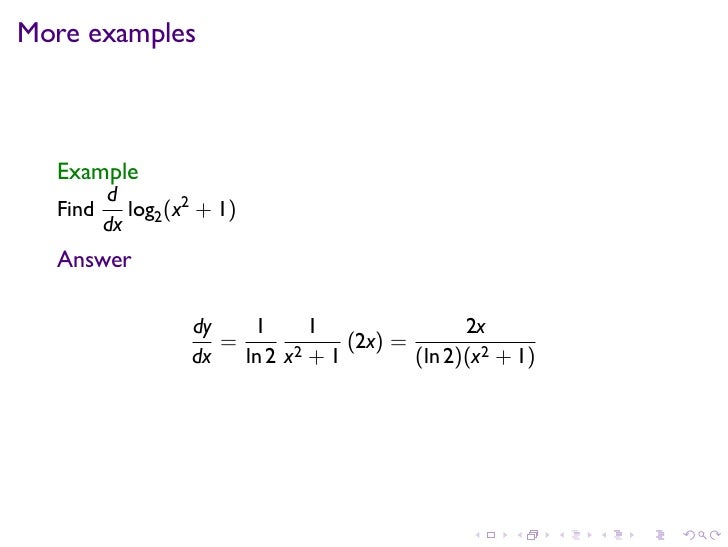



Lesson 16 Derivatives Of Exponential And Logarithmic Functions




Derivative Of Log 10 X Novocom Top




Ex 5 5 7 Differentiate The Function Log X X X Log X




If Y Logx X Then Dy Dx
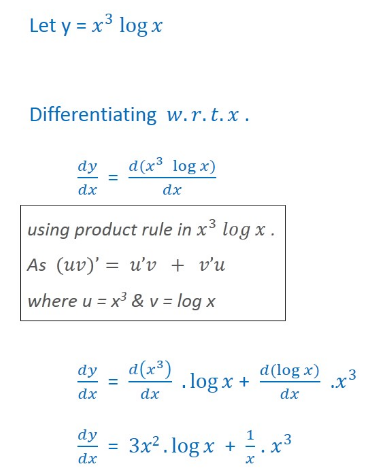



Find The Derivative Of X3 Log X




Derivative Of Logarithm For Any Base Old Video Khan Academy




The Derivative Of Log X Sin X Sins Product Rule Calculus



What Is The Nth Derivative Of Logx Quora




Find The Derivative Of The Function Y Log X2 4x Chegg Com




3 6 Derivatives Of Logarithmic Functions In This Section We Use Implicit Differentiation To Find The Derivatives Of The Logarithmic Functions And In Ppt Download




Y Log A X A X Find Double Derivative Maths Application Of Derivatives Meritnation Com



If Y Log Tan X 2 Find Dy Dx Sarthaks Econnect Largest Online Education Community




Find The Derivative Of Log Sin Log X




Compute The Backward And Center Difference Approximations For The 1st Derivative Of Y Log X Homeworklib




Ex 5 5 3 Differentiate The Function Log X Cos X Teachoo




For Any Function F X Y The First Partial Derivatives Are Represented By F F Fx And Fy X Y For Example If F X Y Log X Sin Ppt Video



0 件のコメント:
コメントを投稿